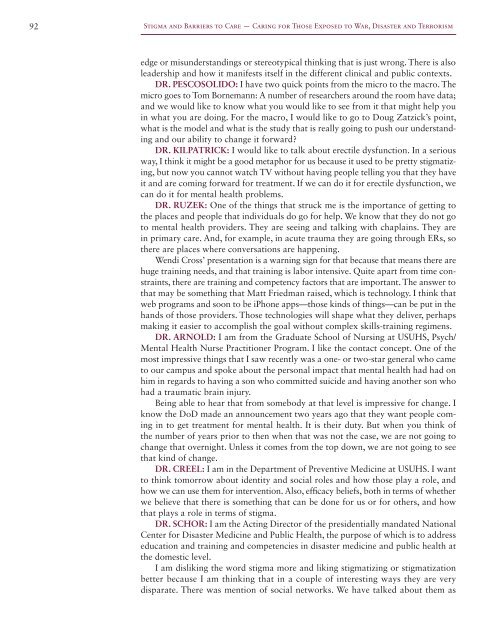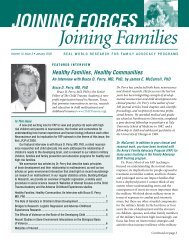stigma and barriers to care - Uniformed Services University of the ...
stigma and barriers to care - Uniformed Services University of the ...
stigma and barriers to care - Uniformed Services University of the ...
Create successful ePaper yourself
Turn your PDF publications into a flip-book with our unique Google optimized e-Paper software.
92<br />
Stigma <strong>and</strong> Barriers <strong>to</strong> Care — Caring for Those Exposed <strong>to</strong> War, Disaster <strong>and</strong> Terrorism<br />
edge or misunderst<strong>and</strong>ings or stereotypical thinking that is just wrong. There is also<br />
leadership <strong>and</strong> how it manifests itself in <strong>the</strong> different clinical <strong>and</strong> public contexts.<br />
DR. PESCOSOLIDO: I have two quick points from <strong>the</strong> micro <strong>to</strong> <strong>the</strong> macro. The<br />
micro goes <strong>to</strong> Tom Bornemann: A number <strong>of</strong> researchers around <strong>the</strong> room have data;<br />
<strong>and</strong> we would like <strong>to</strong> know what you would like <strong>to</strong> see from it that might help you<br />
in what you are doing. For <strong>the</strong> macro, I would like <strong>to</strong> go <strong>to</strong> Doug Zatzick’s point,<br />
what is <strong>the</strong> model <strong>and</strong> what is <strong>the</strong> study that is really going <strong>to</strong> push our underst<strong>and</strong>ing<br />
<strong>and</strong> our ability <strong>to</strong> change it forward<br />
DR. KILPATRICK: I would like <strong>to</strong> talk about erectile dysfunction. In a serious<br />
way, I think it might be a good metaphor for us because it used <strong>to</strong> be pretty <strong>stigma</strong>tizing,<br />
but now you cannot watch TV without having people telling you that <strong>the</strong>y have<br />
it <strong>and</strong> are coming forward for treatment. If we can do it for erectile dysfunction, we<br />
can do it for mental health problems.<br />
DR. RUZEK: One <strong>of</strong> <strong>the</strong> things that struck me is <strong>the</strong> importance <strong>of</strong> getting <strong>to</strong><br />
<strong>the</strong> places <strong>and</strong> people that individuals do go for help. We know that <strong>the</strong>y do not go<br />
<strong>to</strong> mental health providers. They are seeing <strong>and</strong> talking with chaplains. They are<br />
in primary <strong>care</strong>. And, for example, in acute trauma <strong>the</strong>y are going through ERs, so<br />
<strong>the</strong>re are places where conversations are happening.<br />
Wendi Cross’ presentation is a warning sign for that because that means <strong>the</strong>re are<br />
huge training needs, <strong>and</strong> that training is labor intensive. Quite apart from time constraints,<br />
<strong>the</strong>re are training <strong>and</strong> competency fac<strong>to</strong>rs that are important. The answer <strong>to</strong><br />
that may be something that Matt Friedman raised, which is technology. I think that<br />
web programs <strong>and</strong> soon <strong>to</strong> be iPhone apps—those kinds <strong>of</strong> things—can be put in <strong>the</strong><br />
h<strong>and</strong>s <strong>of</strong> those providers. Those technologies will shape what <strong>the</strong>y deliver, perhaps<br />
making it easier <strong>to</strong> accomplish <strong>the</strong> goal without complex skills-training regimens.<br />
DR. ARNOLD: I am from <strong>the</strong> Graduate School <strong>of</strong> Nursing at USUHS, Psych/<br />
Mental Health Nurse Practitioner Program. I like <strong>the</strong> contact concept. One <strong>of</strong> <strong>the</strong><br />
most impressive things that I saw recently was a one- or two-star general who came<br />
<strong>to</strong> our campus <strong>and</strong> spoke about <strong>the</strong> personal impact that mental health had had on<br />
him in regards <strong>to</strong> having a son who committed suicide <strong>and</strong> having ano<strong>the</strong>r son who<br />
had a traumatic brain injury.<br />
Being able <strong>to</strong> hear that from somebody at that level is impressive for change. I<br />
know <strong>the</strong> DoD made an announcement two years ago that <strong>the</strong>y want people coming<br />
in <strong>to</strong> get treatment for mental health. It is <strong>the</strong>ir duty. But when you think <strong>of</strong><br />
<strong>the</strong> number <strong>of</strong> years prior <strong>to</strong> <strong>the</strong>n when that was not <strong>the</strong> case, we are not going <strong>to</strong><br />
change that overnight. Unless it comes from <strong>the</strong> <strong>to</strong>p down, we are not going <strong>to</strong> see<br />
that kind <strong>of</strong> change.<br />
DR. CREEL: I am in <strong>the</strong> Department <strong>of</strong> Preventive Medicine at USUHS. I want<br />
<strong>to</strong> think <strong>to</strong>morrow about identity <strong>and</strong> social roles <strong>and</strong> how those play a role, <strong>and</strong><br />
how we can use <strong>the</strong>m for intervention. Also, efficacy beliefs, both in terms <strong>of</strong> whe<strong>the</strong>r<br />
we believe that <strong>the</strong>re is something that can be done for us or for o<strong>the</strong>rs, <strong>and</strong> how<br />
that plays a role in terms <strong>of</strong> <strong>stigma</strong>.<br />
DR. SCHOR: I am <strong>the</strong> Acting Direc<strong>to</strong>r <strong>of</strong> <strong>the</strong> presidentially m<strong>and</strong>ated National<br />
Center for Disaster Medicine <strong>and</strong> Public Health, <strong>the</strong> purpose <strong>of</strong> which is <strong>to</strong> address<br />
education <strong>and</strong> training <strong>and</strong> competencies in disaster medicine <strong>and</strong> public health at<br />
<strong>the</strong> domestic level.<br />
I am disliking <strong>the</strong> word <strong>stigma</strong> more <strong>and</strong> liking <strong>stigma</strong>tizing or <strong>stigma</strong>tization<br />
better because I am thinking that in a couple <strong>of</strong> interesting ways <strong>the</strong>y are very<br />
disparate. There was mention <strong>of</strong> social networks. We have talked about <strong>the</strong>m as




